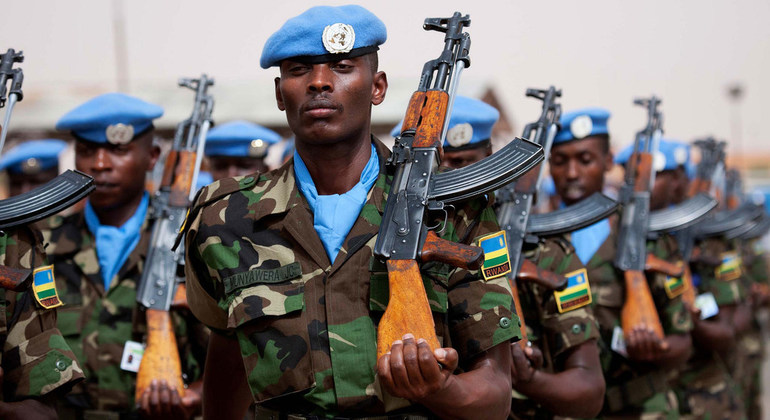Regional
The legacy of Rwandan Peacekeepers in Darfur

In
August 2004 Rwanda deployed troops to the war torn Darfur region of Sudan where
10,000 people had been killed and up to a million others displaced. The
Rwandans – in a contingent of 155 troops – were the first peacekeepers to
arrive in Darfur, following a request by the African Union.
They
served under the then African Union Mission in Sudan (AMIS), until it was
replaced by a new force - the African Union-United Nations Hybrid Operation in
Darfur (UNAMID), a joint African Union (AU) and United Nations (UN)
peacekeeping mission formally approved in July 2007.
On
December 22, 2020, the UN Security Council unanimously adopted Resolution 2559
(2020) to end the UNAMID mandate on December 31, 2020, with full withdrawal to
be completed by 30 June 2021. By all means, Rwandan peacekeepers deployed in
Sudan became good ambassadors of Rwanda.
Theirs,
in many respects came to be known as ‘peacekeeping with a difference’. They,
among other things, built schools and health centers for local communities in
Darfur, demonstrating the values characterising the Rwanda Defence Force (RDF)
in terms of social cooperation with the local population. As a result, the Sudanese
started to identify themselves with Rwandans.
Wherever
Rwandans have been deployed on peacekeeping duty, in Darfur, they maintained
the highest levels of discipline, focused on the mission at hand – protection
of civilians whose lives are at risk – and were the country’s good ambassadors.
Besides providing security to the people where they served, Rwandan
peacekeepers’ initiated initiatives aimed at contributing to physical security
and addressing pressing issues of human security as the bedrock of sustainable
peace.
During
the entire period of their deployment in Darfur, whether under AMIS or UNAMID,
Rwandan troops in collaboration with locals worked together to overcome the
post-war challenges which the latter faced. Rape was a weapon of war in Darfur
especially to the women and girls who went to search for fire wood in the
desert region. To end this form of sexual violence, Rwandan peacekeepers
constructed fuel-efficient stoves which use 70 per cent less firewood than
traditional stoves.
A
simple stove that replaced traditional open fires cut the time the women spent
on potentially dangerous missions looking for wood, while also boosting the
environment and increasing their finances. The Darfuri women had complained
about walking for 10 to 15 kilometers (six to nine miles) to look for firewood
and the Rwandan troops decided to find a solution. Rwandan peacekeepers built different
facilities that benefited all categories from children to the elderly. They
constructed new schools which have many classrooms, latrines, and so much more.
In
addition to their main UN mandated military assignment, they implemented
initiatives such as firewood patrols, construction of energy saving stoves, and
construction of schools and health centers in ZamZam, El Fasher, Kapkabiya and
several other areas. Children who used
to study in poor conditions like under the scorching sun or unroofed schools
are now enjoying Rwandan constructed classrooms.
The
troops introduced Umuganda, the community work exercise undertaken on every
Saturday of the last week of every month in Rwanda, in the areas where they are
deployed. This initiative was embraced
by Darfur residents where, together with Rwandan peacekeepers, they cleaned
markets, car parks, cleared bushes and so much more.
The
children who are now enjoying the facilities built by Rwandan peacekeepers have
a bond with Rwandans. Some have Kinyarwanda names and speak some Kinyarwanda
words. Whenever refugees felt insecure they run to the IDP camps protected by
Rwandan peacekeepers.

